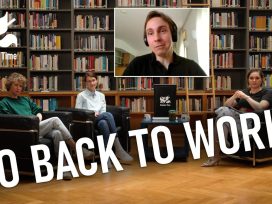In march, a storm broke out on social media over what users described as ‘the most depressing advert of the year’. Produced by the ‘online marketplace’ Fiverr, it featured an exhausted-looking woman, her cheeks hollow and her hair dishevelled, above the mock-heroic slogan: ‘You eat a coffee for lunch […] sleep deprivation is your drug of choice. You might be a doer.’

Source: Twitter @b_cavello
Like many online platforms which have proliferated in the past decade, Fiverr allows individual ‘doers’ to sell their particular skills – from IT programming to designing a book cover – without the fees and paperwork associated with temping agencies or formal contracts. Similar services, such as Uber, Deliveroo and Airbnb, enable individuals to operate with relative autonomy outside traditional structures, with minimal bureaucracy, regulated working time or interference from bosses or supervisors. It has recently been estimated that 3 percent of the UK workforce provides a service through the ‘gig’, ‘on-demand’ or ‘sharing’ economy, across a
broad range of sectors. However, such jobs, if relied on for one’s main income, also come without a guaranteed living wage, paid holiday, access to pensions, insurance or healthcare schemes, minimum or maximum working hours, or the security of a steady salary.
In place of these expectations, fought for by generations of workers and in some cases only recently obtained, employment for many is increasingly characterised by short-term, casual and precarious work, with little real control or power available to the worker. Fiverr’s advert, placed in magazines and subway stations where many ‘doers’ were confronted with it while engaged in the very kind of constant, frequently exhausting, round-the-clock pitching and hustling it sought to glorify, was decried for adding aesthetic insult to economic injury.
What is work?
We are used to thinking of employment as a two-way contract which guarantees the worker, in return for their regular labour, enough remuneration for a reasonable standard of life. Recent research by the New Economics Foundation, however, found that two in every five people currently employed in the UK are in work that fails to provide a secure living wage. Four months after Fiverr’s advert marked the emergence in daylight – or in strip-lit subway tunnels, at least – of forms of work tied to an unregulated twilight economy, Matthew Taylor published the results of his government-commissioned inquiry into UK working practices. The Taylor Review constituted an official recognition of new types of work, including increasing casualisation and the spread of the gig economy, which are fundamentally altering traditional expectations of employment, welfare and workers’ organisation. But it has long been evident that the world of work inherited from late-20th-century capitalism is rapidly being reshaped.
After the 1970s crisis, Britain saw its reliance on manufacturing and heavy industry replaced by a new, ‘neoliberal’ order that has damaged both the political power of trade unions and the social fabric of post-industrial areas. in the decades that followed, increasing numbers of service and administrative jobs, from catering and rubbish removal to nursing and care working, were ‘outsourced’ to agencies whose workers are hired on a casual or zero-hours (i.e. without a guaranteed number of hours of work per week or per month) basis. The more recent and spectacular spread of automation, meanwhile, is predicted to affect around 35 percent of UK jobs in the next two decades, with few industries remaining untouched and routine manual jobs most at risk.
As apps and automation reconfigure work, what happens to how we think about ‘the working class’? The communities of manual, domestic and clerical workers called into being by industrial capitalism, who formed a majority of British society throughout the 20th century, now largely languish in areas defined by their lack of work, reliance on benefits, and subsequent demonisation in culture and politics. BBC research published in April 2013 as the Great British Class Survey, which divided UK society into seven layers, seemed to suggest that class was becoming defined on a cultural and social rather than occupational basis, in line with the nuanced framework proposed by Pierre Bourdieu in 1979. But while social and cultural expression and engagement may be less reliable as class markers, economic relationships remain fundamental in how people see themselves and others. Selina Todd’s The People: The Rise and Fall of the Working Class 1910-2010 (John Murray, 2014) concludes by emphasising that a majority of British people still identify as working class, and around half of respondents to the Great British Class Survey were characterised by their low levels of economic capital. On the lowest rung of the great British Class Survey’s taxonomy was the ‘precariat’, defined by its occupational and economic insecurity. This group was previously the subject of Guy Standing’s 2011 polemic The Precariat (Bloomsbury), in which he dubbed it a ‘new dangerous class’, whose plight could generate anger, violence and susceptibility to fascism unless addressed by social reforms geared towards financial security.
Not everybody agreed with this analysis of the precariat as a separate and distinct group of workers. Casual and precarious conditions have always existed for many workers, especially for those who differ from the ideal of the white, male breadwinner. Job security, promotions and pensions have always been scarcer for those less able to access secure full-time employment and those on the fringes of society, whether single mothers, migrant workers or the long-term unemployed. Seen from a wider angle, it is full and secure employment, not precarity, which looks like the historical exception. The UK’s transition to capitalism saw agricultural work fall from 80 percent of employment in medieval Britain to less than 1 percent today, while artisan craftwork gave way to mechanised and specialised production in mills and factories. This transition also altered the time, space and cultural associations of work, from the daily and seasonal rhythms that structured agricultural labour to a working day bound by the strictures of shift work and the assembly line. The regular nine-to-five of office work was a further conceptual change, with the attendant ideas of career progression and company loyalty developing in a new layer of white-collar workers. The reorganisation of the working day through working from home, night-shifts, overtime and ‘family-friendly’ flexible working has already undermined the idea of a nine-to-five, Monday-to-Friday routine. But while casual and insecure work may not be new, under neoliberalism it is increasingly widespread and established as acceptable, with far fewer workers insulated from its effects.
The UK’s current record low unemployment figures mask a multitude of problems. Since the 2008 financial crisis, more than 40 percent of job growth has been through self-employment, while agency work has grown by 46 percent. Self-employed workers are not guaranteed the minimum wage, and their numbers are rising as employers encourage their workers to classify themselves as self-employed in order to save tax. The UK also has almost one million workers on zero-hours contracts, compared with 225 such workers in 2000. Zero-hours contracts predominate in service sectors, such as retail, food, and hospitality, but also increasingly in healthcare and social work. While zero-hours contracts, like many aspects of the gig economy, are praised for allowing individuals to work ‘flexibly’, the reality often falls short of the ideal, and one in three workers say they want or need more hours. Workers who cannot earn enough to support themselves on such contracts must choose between finding secondary work or applying for supplementary state support, adding to the stress generated by an insecure contract and uncertainty about how much they will earn each week. Precarious work interacts with other axes of disadvantage: analysis by the Trades Union Congress, the official representative body of British trade unions, shows that non-white workers are about one-third more likely than white workers to be on temporary or zero-hours contracts, with those on zero-hours contracts also more likely to be young or female, and migrant workers also prominent in the gig economy. Automation, by reducing the demand for mid-skilled workers while increasing the demand for high-level workers with creative and analytical skills, could further accelerate workforce polarisation, creating a diminishing elite of salaried owners and managers and an ever-expanding impoverished and insecure precariat.
A new way of working?
Technology has eroded the old world of work while also being a key driver of the emergent economy. Contracts and communication built around smartphone apps and online hubs have challenged the need for offices, payroll structures, career progression and other fundamentals of 20th-century capitalism. But while we may have moved beyond the discipline of factory shifts and office hours, the on-call nature of flexible and freelance working can make it difficult to ‘clock off’ and prevent the intrusion of work into personal life. If work can materialise at any time and from anywhere, and must be grabbed instantly before the competition, can a worker ever not be poised in anticipation of the next job? (A promotional video for Fiverr advocates, with apparent earnestness, that freelancers answer the phone to a potential client even if in the middle of having sex.) The emphasis on individual drive and commitment as the primary guarantee of work, rather than the security of a collectively agreed employment contract, intersects mercilessly with the neoliberal logic that decrees an individual’s economic situation to be the result of their intrinsic merit rather than any political factor, and that sees remedying unsatisfactory circumstances as the responsibility of the individual rather than the state. Caught between the removal of steady work that pays a living wage and the political and cultural push towards individualism, working oneself to exhaustion can appear not only unavoidable but even something to aspire to.
In July 2017, a report into Uber’s working conditions accused it of treating its employees like Victorian ‘sweated labour’, while circumstances for casual workers at a distribution centre for clothing retailer Sports Direct were compared to those of ‘a Victorian workhouse’. Among 19th-century workers, insecure and degrading conditions spurred the growth of mass trade unionism, with its demands for eight hours’ work, leisure and rest each day, and a wage that could support a family. Stable employment was eventually enshrined as part of the social provisions of postwar Britain. The 1980s onslaught on organised labour saw British unions undergo a drastic drop in power and membership, and traditional unions have been reluctant to engage with the unfamiliar territory of the gig economy, where the standards for pay, stability and pensions that the movement established now seem almost like quaint, fringe demands.
But this reticence has not prevented independent and autonomous organisation by casual and gig economy workers themselves. Uber is currently contesting its operational ban by Transport for London over safety concerns, but in October 2016 two Uber drivers took the company to an employment tribunal on behalf of a larger group, arguing successfully that Uber’s 40,000 UK drivers were not self-employed and should receive both the minimum wage and paid holiday. (Although Uber classifies its drivers as self-employed, drivers complain that the company nonetheless treats them like regular employees, seeking to control their working patterns and rates.) The fast-food sector, like much of the retail and service industry, has historically gone un-unionised, owing to its rapid turnover of workers and hostility from employers. September 2017, however, saw the first ever UK strike by McDonald’s workers, demanding an end to the use of zero-hours contracts. The previous year saw successful ‘wildcat’ strikes by Deliveroo food-delivery riders against a new payment structure that would have increased time pressure and risk-taking by workers. Autonomous and wildcat actions, organised outside existing systems of industrial relations and circumventing traditional legal processes, seem an appropriate response to an economy in which existing conventions on working hours, pay and conditions are similarly sidestepped.
As work becomes more uncertain and unstable, and workers variously resist, subvert or adapt to new conditions, might it be possible to reject them altogether? David Frayne’s The Refusal of Work (Zed, 2015) looks at the tradition – from William Morris’s early utopian socialism to the Italian autonomist movement and André Gorz’s proposal for shorter working hours – which goes beyond demands over pay and conditions to call for richer lives outside work, focusing on self-development, creativity and civic engagement. Currently, as Frayne recognises, realising this anti-work philosophy in practice is risky for all but a privileged few. Both Weber and Marx observed how the compulsion to work is embedded in the logic of capitalist society, and neither the loss of manufacturing nor the rise of automation has eradicated the political and cultural tendency to valorise the work ethic and vilify the workless ‘scrounger’ or ‘benefit fraud’. The far-reaching associations of being made ‘redundant’, a term that can seem to encompass not merely employment status but our worth and purpose as an individual, demonstrate how fundamental work is to our idea of ourselves.
Yet by reshaping the world of work and reducing the need for workers, automation may make the idea of opting out more feasible – or indeed inevitable. By articulating alternative visions of society, we may anticipate and soften this blow. Nick Srnicek and Alex Williams argue, in Inventing the Future: Postcapitalism and a World Without Work (Verso, 2015) that automation is not a threat but a promise, with the potential to liberate societies by ending arduous and tedious work, rather than enriching an elite. Building on earlier critiques of work, Srnicek and Williams argue that harnessing advances in technology, combined – crucially – with the prospect of a universal basic income, which would enable people to survive without taking dislikeable or unsuitable jobs, could mean that work can be relinquished on a collective rather than individual basis, and engaged in through
free choice rather than external forces. We are conditioned from an early age to see work not simply as a source of material support but as something that can provide us with control, security, pride and purpose, as well as helping us realise our skills, interests and ambitions. For many of us, some or all such requirements have become unattainable. The rise of automation and its ‘theft’ of jobs has long been resisted by some unionised workers, but it also offers an opportunity to rethink the basis of work and to resolve its unsatisfactory and alienating aspects. In a best-case scenario, we may arrive at a post-work future, no longer shaped by capitalist impulses or built around low-paid and insecure drudgery, where we can find alternative channels of meaning and fulfilment, and cease to regard ourselves as workers above all else.








